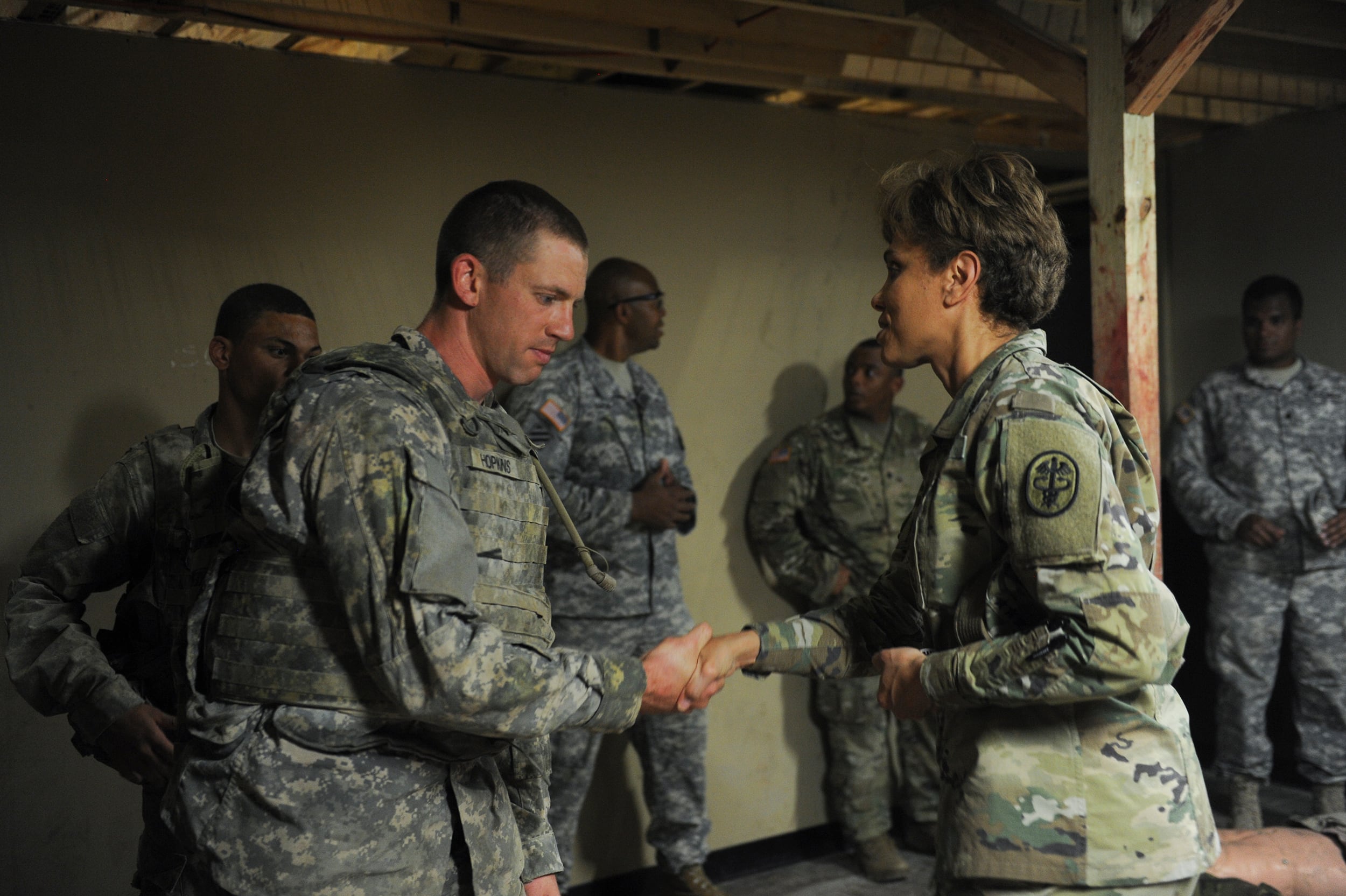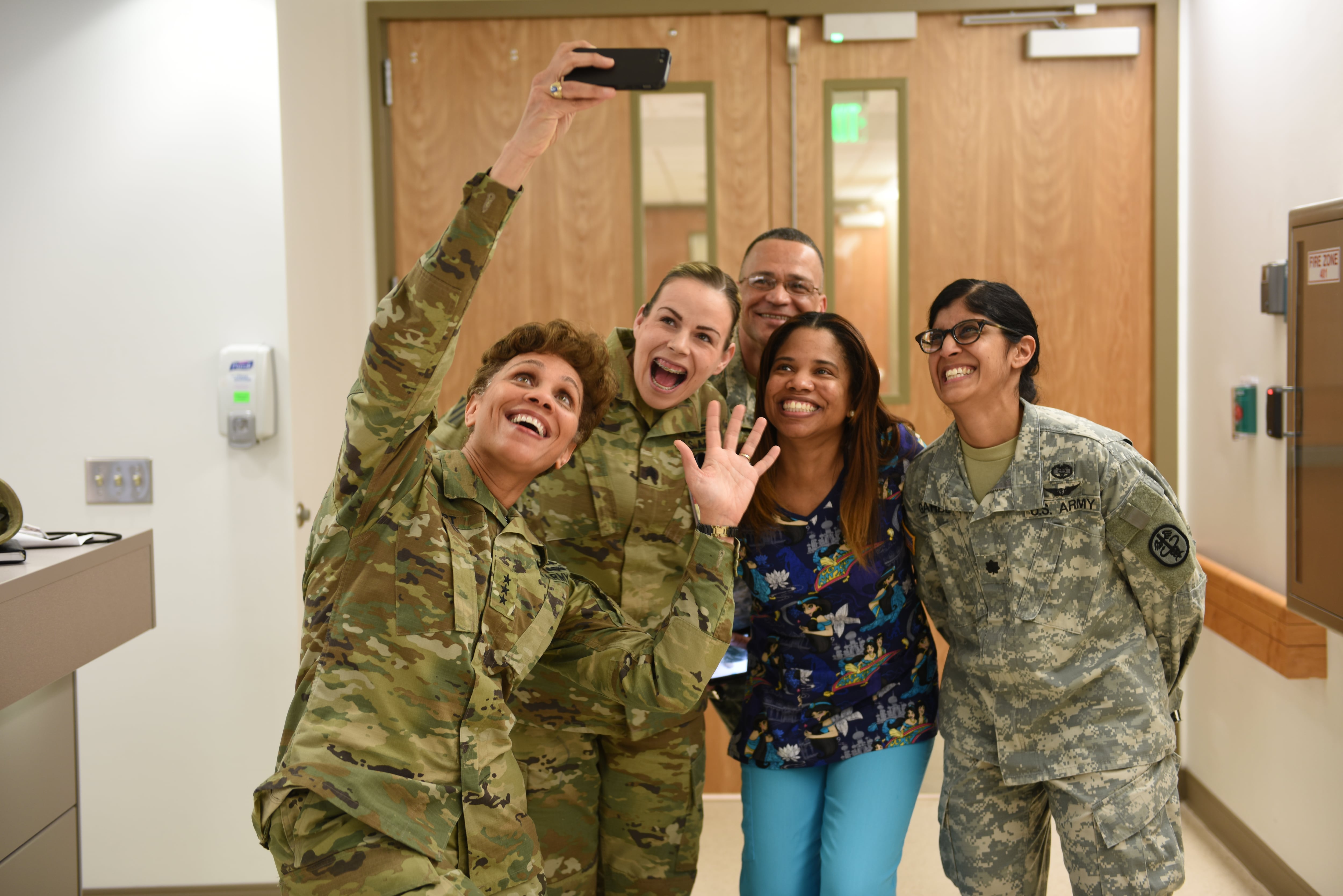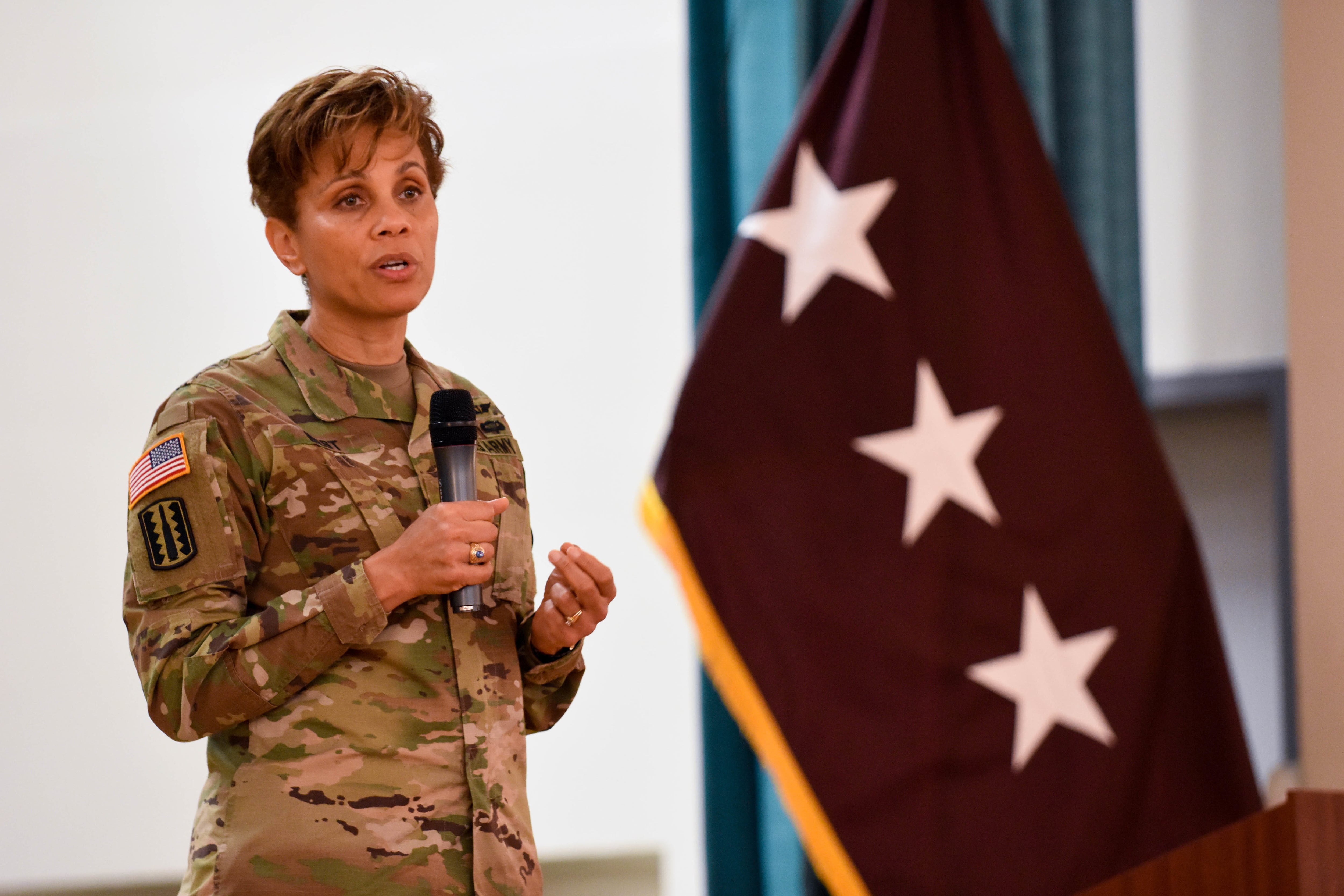Her father's 33-year career inspired her to join the Army, and her West Pointer brother encouraged her to attend the newly integrated U.S. Military Academy.
But it was Mr. Spock, the science officer on the starship Enterprise, who inspired her to go into biology.
"I thought he was really cool," she told Army Times in a Feb. 22 interview. "Oh my gosh, I wanted to be a Vulcan. And I wanted to be a scientist."
West, a career family medicine doctor and dermatologist who boasts airborne and air assault qualifications, became the 44th Army Surgeon General in December 2015. She is the first black female lieutenant general in the Army and the highest-ranking woman to graduate from West Point.
She sat down with Army Times during Black History Month to talk about her journey. Questions and answered have been edited for brevity.

Lt. Gen. Nadja West hands a coin to Spc. Dan'l Hopkins, of the 1st Cavalry Division, during her visit to Fort Hood, Texas, on May 5, 2016. West became the Army surgeon general in December 2015.
Photo Credit: Kelby Wingert/Army
Q: What put you on your path to becoming the first black, female lieutenant general?
A: I joined the Army because I come from a military family. I kind of grew up eating, drinking, breathing, living Army. My dad was in — he joined the Army in 1939, when the Army was segregated, and stayed in for 33 years.
Nine of my siblings were serving. I'm the youngest, so to me it was just something I couldn't wait to do. I knew I would be serving in some capacity in the military.
I was in college prep training in high school, and I was interested in going into ROTC. [But] I had a brother that graduated from West Point. He graduated in 1976, and they were just starting to have women apply. That summer was the first class of women. So he said, "hey, you know, if you want to go ROTC, why not go to West Point?"
For the medical part, I really hadn't settled on that. I really liked science. In fact, I was jokingly telling folks, "I'm a Trekkie." In the 1960s, I was five years old when Star Trek was first on. You had Lt. Uhura there, an African-American female that was on the bridge and an officer. But I really wanted to be Mr. Spock, the science officer.
And then I liked working with people. Medicine is one of those places where you can have the best of both worlds.
Q: How did your dad's experiences shape your understanding of the Army?
A: Yes, it was segregated. The first basic training that he did was at Fort Huachuca, Arizona — that's where they sent all the colored troops. He said that the cadre found that that was a punishment tour. "Why do we have to go and train these soldiers?"
But he could see them evolve. Because you can’t get to know someone and work with them and not form a bond, unless you’re just hardcore not a nice person. Most of these folks are just a product of their environment.
He saw that as an opportunity for one-on-one interaction, where it wasn’t allowed anywhere else during that time. He saw it evolve and found it was an organization that led the way. The Army was integrated long before society was integrated.
He saw the organization as one where people were given the chance.
Q: What advice did he give you when you joined?
A:
The one thing he said to me, that I’ll never forget, he said, "Hey, I know you’re going to be going away. I can’t tell you what to do, but there’s nothing worse than a drunk female. So stay away from alcohol."
Do your best, comport yourself in a dignified manner. And really work hard, because you’ve got people watching you. People are going to look at you, and your mistake is going to reflect on a lot of people. Your success is going to reflect on more people.

Lt. Gen. Nadja West, left, Army Surgeon General and commanding general, U.S. Army Medical Command, takes a selfie with pediatrics staff at Womack Army Medical Center, Feb. 17, 2016. West credits Mr. Spock from the TV series "Star Trek" for inspiring her to pursue a career in the sciences.
Photo Credit: Eve Meinhardt/Army
Q: Did you ever feel singled out because of your race?
A:
I remember the traumatic event at West Point — everyone had to cut their hair. I have really curly hair, and I went to the barber shop, and they just chopped it up. I was horrified. And of course people laughed and made fun of my hair, but of course, people are going to be like that.
That was one of the times that I felt I was being singled out, and because your hair had to be a certain length, and my hair grows out, not down, they had rulers and they would come and measure.
One time, I remember thinking it was really weird that they were going to bring a ruler to formation. And one of my roommates was like, "Gosh, that’s not fair," because, you know, she had straight hair.
I used to have it long and just snatch it back in a bun because it was easier. During different phases, I would just let it go natural, but then when you take your hat off and on, it doesn’t look right. So now I just take a curling iron and curl it under.
Q: How did being black and female inform the way you carried yourself?
A:
I think I put a lot of pressure on myself for that. I really had a lot of support from people of all races and colors. Most of my mentors were white males. There were a lot of folks that helped me get where I am today.
But I would put more pressure on myself because I knew if I were to do something, it would be, "Here goes another female doing this." I would never want to fall out of a run, because it would be, females can’t run. I used to say, I’ll drop dead before I fall out. I didn’t want to let my fellow women down.
If you look at the jobs that I’ve had, I’ve done very well. I don’t think I’ve been suppressed or not able to take a job based on my qualifications. The fact that I’m sitting here today talking to you shows that, given a fair chance, given an opportunity to compete for various jobs, I’ve been treated very well by my Army.
I think in general, as an institution, I think the Army is leading the way in ensuring there’s fairness. I saw the numbers of the most recent [West Point] class, the number that selected infantry and armor, and I was just smiling ear to ear because it’s unheard of. I’ve been a product of an organization that’s a learning and a growing organization.
Meghann Myers is the Pentagon bureau chief at Military Times. She covers operations, policy, personnel, leadership and other issues affecting service members.





